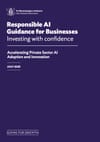⚡ Quick Summary
This document by MBIE offers a structured, practical reference to help New Zealand businesses adopt AI responsibly. It emphasizes a proportional, lifecycle-based approach to governance and integrates well with existing business functions like compliance, cybersecurity, and stakeholder engagement. Rather than introduce a new framework, it shows how responsible AI can extend what companies already do—aligning with OECD AI principles and local values, including te ao Māori perspectives. The focus is squarely on usability: layered structure, tips, scenarios, and appendices make it accessible to firms with limited in-house AI capacity.
🧩 What’s Covered
The guide is built on three core layers:
- Understanding your ‘why’ for AIEncourages firms to define clear purposes for AI systems, assess lawful use, understand benefits and risks, and align AI with core values and stakeholder expectations.
- Good business foundationsIntegrates responsible AI into existing business functions:
- Governance and accountability
- Legal obligations and compliance
- Risk management
- Recordkeeping
- Stakeholder consultation
- Cybersecurity and procurement
- Privacy, transparency, and feedback channels
- Māori data governance and cultural context
- AI system-specific considerationsCovers technical and operational risk areas:
- Fit-for-purpose and ethically sourced data
- Model efficacy and system outputs
- Use of GenAI inputs/outputs
- Human-in-the-loop design
- Safe experimentation via AI sandboxes
The document includes:
- Checklists for readiness
- A glossary of key AI terms
- Tips in blue boxes for mitigation
- Scenarios in yellow boxes for applied examples
- Guidance for ethical dataset sourcing (Appendix 3)
💡 Why it matters?
This is one of the few national-level guidance documents that hits the middle ground: concrete enough for SMEs, yet strategic enough for larger firms. It avoids generic ethics slogans and instead links responsible AI to business continuity, customer trust, and legal clarity. It’s especially useful in regions where AI governance capacity is growing but not yet institutionalized.
❓ What’s Missing
- No KPI frameworks or maturity models
- No sector-specific risk tailoring
- International firms may find the localized legal references too narrow (e.g., New Zealand-specific legal duties)
- GenAI risks are noted but underdeveloped compared to other sources
👥 Best For
- New Zealand businesses developing or deploying AI (especially SMEs)
- Legal, IT, and risk managers seeking a practical anchor for AI responsibility
- Policymakers looking for examples of proportionate national guidance
- Procurement teams assessing vendor practices
- Cross-functional AI steering groups or ethics panels
📄 Source Details
Title: Responsible AI Guidance for Businesses: Investing with Confidence
Publisher: Ministry of Business, Innovation and Employment (MBIE), New Zealand
Date: July 2025
Length: 43 pages
Type: Voluntary guidance aligned with OECD AI Principles
Scope: National (New Zealand), lifecycle-based, sector-agnostic
ISBN: 978-1-99-106955-9 (print), 978-1-99-106999-3 (online)
Access: mbie.govt.nz
📝 Thanks to
The MBIE team and contributors to New Zealand’s AI Strategy for providing a grounded, clear-eyed model of what responsible AI can look like for real-world businesses. This is practical governance, not theater.


